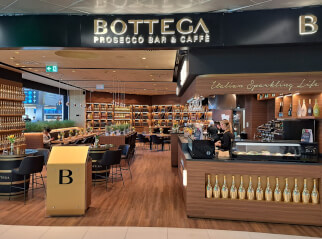DFA’s Leon Falic discusses Brazil, US land border & airports
During the course of the pandemic, Duty Free Americas (DFA) has found its land border business in North America on both borders to be quite good, says DFA President Leon Falic, and all stores on these borders are open. In some cases these stores are doing even better than they were pre-pandemic. “Road travel is not seen as a problem like air travel is. When people are in their cars they feel safe. Essential workers are crossing borders, so borders are doing well for us.”
The same cannot be said for airport stores or the newly opened store on the Brazilian border, however. Falic says: “Some of our businesses are suffering and some are benefiting.” He adds that some of the airports are improving, such as Miami International.
Slow start in Brazil
The operator has so far opened one of three stores in Brazil, but business is slow. The country has been especially hard hit by the pandemic. Also, given that the surrounding borders are not open, traffic is extremely limited. Falic says: “Brazil is one of the countries that has suffered the most. Business at the border store is quiet. We have opened the border store, but Brazil is very tough. The country does not seem to have recovered. In addition to the pandemic, the Brazilian currency is down 25% which also has a significant impact for duty free customers looking for savings in US Dollars.”
It’s too early to tell if Brazilians shopping in their own stores will have a big impact, according to Falic, but sales are far lower than expected. “Although Brazil’s borders have remained open, with no Carnival, with other restrictions on travel, with incomes affected by the pandemic and with a fear of getting the virus, one would think sales would be considerably lower than previously anticipated, and this is the case. It’s been slow.”
Despite the less-than-auspicious beginning in that country, Falic says store openings are moving ahead as planned and the company will be bidding on new tenders. One of three stores is currently open; this store is located in Uruguaiana, the second-largest city on the Brazilian border with Argentina. DFA also has border businesses in Venezuela on the Colombian border, on the Panama/Costa Rica border, and in Uruguay.
As with all its stores, the operator is ensuring that the consumer feels safe while shopping in the Brazil store and that the correct health protocols are in place in terms of store cleaning, hand sanitizer provision and social distancing. Despite all these efforts and more, Falic says the company was forced to throw away “tons” of expired confectionery products and other items with seasonal time limits.
E-commerce
DFA’s e-commerce business has been strong because of the new retail dynamic triggered by the crisis, but Falic doesn’t see online services such as click-and-collect replacing physical duty free stores anytime soon. He believes the shopping experience is important and that once people are able to shop in-store again they will want to. “There is something about being at the airport, being in a mall, finding new items. I don’t think the whole business will go online; I think part of the business will go online for an educated consumer and those who know exactly what they want, but duty free shops will still be a big part of the business. The beauty of duty free as an industry is, we get our customers and travelers’ undivided attention while they’re at an airport. Unlike other attractions and retail outlets who are trying to recover and begging customers to come back to shop physically, we are in a unique position where traffic comes to us. In a few cases e-commerce can be a negative. Especially where we have walk through stores and we want our customers seeing everything we have to offer in person where our conversion is much higher than online.”
Airport contracts
The time may have come when retailers and airports are finally able to revise the system that has been in obvious disrepair for some time. Falic says while negotiations have been taking place, it’s about a whole lot more than just securing extensions. “Minimum annual guarantees, for example, are just unsustainable for now. At least part of the contract will need to be based on sales. We will all need to work together to ensure our businesses grow at the same time.”
He says he has never seen the industry come together as it has during this time, and he is hopeful this can continue into the future so everyone can benefit. “Airports are an important part of our business, but we’ll have to see how this plays out. Things are changing.”
The coming recovery
Falic expects that airport stores will begin growing “exponentially” once people are able to travel again. “I think people will want to travel and get back on a plane. There are two issues here: one is traveling and another is shopping. I believe people do want to spend and shop, but right now they are concentrating on getting the vaccine. Wherever we have seen traffic we are encouraged by the results, customers are coming back with a willingness to engage and buy. They are looking for known brands and a good deal.”
Even then, Falic does not expect a quick post-vaccine recovery. “There are several questions, such as how confident people will be to travel after they have the vaccine and how effective the vaccines will be. We don’t want our business to be based on speculation. We want to base it on what we see. We will continue navigating through this crisis and hopefully doing well.”
He is, however, looking forward to continued improvement as the vaccine rolls out and travel begins to return. For now, Falic’s plans for the coming months is to “fight through,” and he expects traffic to return to normal around 2023-2024.


.jpg?&resize.width=322&resize.height=483)







